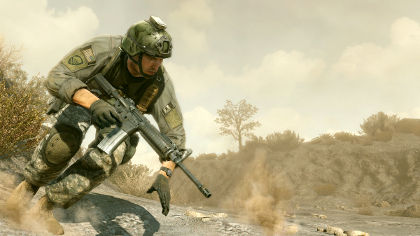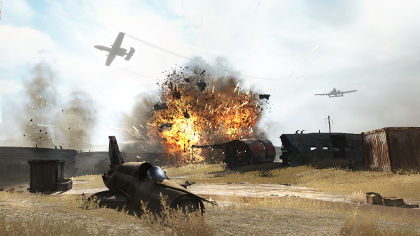
This feature’s a bit special, readers: we’re including three sample tracks from the official Medal of Honor score, now available to purchase on Amazon and iTunes. All we’re asking is that you read Alex’s excellent article in full – get the links below. – Ed
Ever since the original Medal of Honor’s release in 1999, music has been one of the most important elements of the franchise. With an orchestral brilliance almost unmatched in the industry, the scores for the series have brought the experiences to life, leaving a noticeable impact on players. Inspiring feelings of hope and dread, exhilaration and despair, glory and tragedy, the music has seemed to infuse every event in the games with an emotion and reverence that resonate far beyond entertainment.

Music seldom gets much notice in games reviewing.
This impressive achievement has paid off for the composers of the series as well. Besides selling thousands of soundtrack albums, the series brought Michael Giacchino well-earned recognition from Hollywood where he has spent the past few years composing for shows like Alias and Lost and films like the latest Star Trek and Pixar’s Up that recently earned him an Academy award. Christopher Lennertz’s music from the franchise was heard in a national ad campaign during the 2008 presidential election, and he’s had the chance to conduct some of his favorite Medal of Honor works for enthusiastic audiences at orchestral concerts from California to the Netherlands.
Play Music Track: “Heroes Abroad”:
With this year’s reboot of the franchise, however, things move from the sepia-tinted beaches of Normandy to the rocky slopes of 21st century Afghanistan. The music follows suit with a far edgier contemporary score by composer Ramin Djawadi, who started fresh for this latest installment while remaining mindful of the legacy left behind by the previous composers.
“Both Michael Giacchino and Chris Lennertz have written terrific scores for the previous games,” he acknowledges. “What really intrigued me was that the music for these games was incredibly emotional besides also having action music. I wanted to make sure that I stayed true to that approach of the Medal of Honor franchise.”
A greater sense of intensity
Best known for scoring recent films like Iron Man and Clash of the Titans as well as TV shows like Prison Break and FlashForward, Djawadi actually started with audio work on games like Thief II and System Shock 2 before joining Hans Zimmer’s Remote Control Productions near the turn of the century and eventually striking out on his own a few years later. And though this is his first time fully scoring a game, he admits to having loved the medium since childhood despite not having the time to play much anymore.
“I think that they are a great form of entertainment,” Djawadi says of video games. “As a player you can really get lost in the world of the game. The fact that you control the character can be more intense than watching a movie.” But of course games offer their own challenges from a composing point of view as well. “The biggest difference is that most of the music is not written to picture, but rather captures the mood of a certain scene in a level. Other than that I approached the game the same way as film.”

A clever composer will tie his or her compositions closely to the level script.
Djawadi started work on Medal of Honor fairly early on in the project, eventually completing the score over the course of 1½ years. “I enjoyed being on board so early as I could see how the game was taking shape and the levels were developing,” he says. Throughout the project he worked from gameplay videos whenever possible, which he found invaluable for the composing process. “It was very inspiring to let [those] run in the background while writing,” says Djawadi.
Play Music Track: “Falling Away”:
But it was the extensive meetings at the beginning that determined the direction of the music. “We created a huge spread sheet with the overall layout of where we wanted to place score,” Djawadi explains. “Stylistically, we went for a whole new approach. As the game is now set in the present, we wanted to modernize the music. The location of where the game takes place certainly demanded for a different instrumentation. We wanted to capture a certain rawness and refrained from using lush big orchestra too much. A lot of ethnic solo instruments were used throughout the score.”





 Satoru Iwata Video Interview - the late Nintendo president spoke with Kikizo in 2004 as 'Nintendo Revolution' loomed.
Satoru Iwata Video Interview - the late Nintendo president spoke with Kikizo in 2004 as 'Nintendo Revolution' loomed. Kaz Hirai Video Interview - the first of Kikizo's interviews with the man who went on to become global head of Sony.
Kaz Hirai Video Interview - the first of Kikizo's interviews with the man who went on to become global head of Sony. Ed Fries Video Interview - one of Xbox's founders discusses an epic journey from Excel to Xbox.
Ed Fries Video Interview - one of Xbox's founders discusses an epic journey from Excel to Xbox. Yu Suzuki, the Kikizo Interview - we spend time with one of gaming's most revered creators.
Yu Suzuki, the Kikizo Interview - we spend time with one of gaming's most revered creators. Tetris - The Making of an Icon: Alexey Pajitnov and Henk Rogers reveal the fascinating story behind Tetris
Tetris - The Making of an Icon: Alexey Pajitnov and Henk Rogers reveal the fascinating story behind Tetris Rare founders, Chris and Tim Stamper - their only interview? Genuinely 'rare' sit down with founders of the legendary studio.
Rare founders, Chris and Tim Stamper - their only interview? Genuinely 'rare' sit down with founders of the legendary studio. The History of First-Person Shooters - a retrospective, from Maze War to Modern Warfare
The History of First-Person Shooters - a retrospective, from Maze War to Modern Warfare